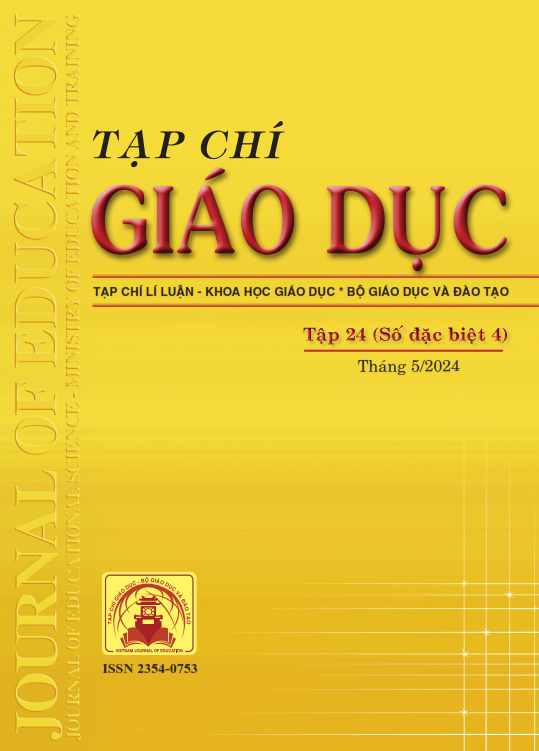Biện pháp phát triển kĩ năng giao tiếp cho học sinh trong dạy học môn Tự nhiên và xã hội ở tiểu học
Tóm tắt
Communication skills are one of the most crucial talents to develop in primary school students in the twenty-first century. This article examines ways for improving students communication abilities while teaching in primary schools. The qualitative research approach is used to study and analyze important academic texts, whereas the description method is used to present pedagogical measures that will impact learners. The research findings revealed two types of communication: verbal communication and nonverbal communication. To improve student communication skills, use the following strategies: 1) Designing instructional content with the goal of developing communication skills for students; 2) Choose teaching methods and techniques that allow develop communication skills for students; and 3) Creating and implementing assessment tools to help students develop communication skills. This paper may serve as a reference for future research, as well as a suggestion to teachers in the process of teaching Natural and Social subject in order to build students’ competencies.
Tài liệu tham khảo
Bộ GD-ĐT (2018a). Chương trình giáo dục phổ thông - Chương trình tổng thể (ban hành kèm theo Thông tư số 32/2018/TT-BGDĐT ngày 26/12/2018 của Bộ trưởng Bộ GD-ĐT).
Bộ GD-ĐT (2018b). Chương trình giáo dục phổ thông môn Tự nhiên và Xã hội (ban hành kèm theo Thông tư số 32/2018/TT-BGDĐT ngày 26/12/2018 của Bộ trưởng Bộ GD-ĐT).
Grace, D. M., & Gilsdorf, J. W. (2004). Classroom strategies for improving students’ oral communication skills. Journal of Accounting Education, 22(2), 165-172. https://doi.org/10.1016/j.jaccedu.2004.06.001
Greenstein, L. M. (2012). Assessing 21st century skills: A guide to evaluating mastery and authentic learning. Corwin Press.
Gruba, P., & Al-Mahmood, R. (2004). Strategies for communication skills development. ACE ‘04: Proceedings of the Sixth Australasian Conference on Computing Education, pp. 101-107. Australian Computer Society, Inc.
Ihmeideh, F. M., Al-Omari, A. A., & Al-Dababneh, K. A. (2010). Attitudes toward Communication Skills among Students’-Teachers’ in Jordanian Public Universities. Australian Journal of Teacher Education, 35(4), 1-11. Iksan, Z. H., Zakaria, E., Meerah, T. S. M., Osman, K., Koh, D., Mahmud, S. N. D., & Krish, P. (2012). Communication Skills among University Students. Procedia: Social & Behavioral Sciences, 59, 71-76.
Kyaw, B. M., Posadzki, P., Paddock, S., Car, J., Campbell, J., & Tudor Car, L. (2019). Effectiveness of Digital Education on Communication Skills Among Medical Students: Systematic Review and Meta-Analysis by the Digital Health Education Collaboration. Journal of Medical Internet Research, 21(8), e12967.
Marteau, T. M., Humphrey, C., Matoon, G., Kidd, J., Lloyd, M., & Horder, J. (1991). Factors influencing the communication skills of first-year clinical medical students. Medical Education, 25(2), 127-134.
Ngô Giang Nam (2013). Giáo dục kĩ năng giao tiếp cho học sinh tiểu học nông thôn miền núi phía Bắc. Luận án tiến sĩ Giáo dục học, Đại học Thái Nguyên.
Saunders, S., & Mills, M. A. (1999). The knowledge of communication skills of secondary graduate student teachers and their understanding of the relationship between communication skills and teaching. Paper presented at AARE Annual Conference, Melbourne.
Scheffer, S., Muehlinghaus, I., Froehmel, A., & Ortwein, H. (2008). Assessing students’ communication skills: Validation of a global rating. Advances in Health Sciences Education: Theory and Practice, 13(5), 583-592. https://doi.org/10.1007/s10459-007-9074-2
Stevens, R. (2015). Role-play and student engagement: reflections from the classroom. Teaching in Higher Education, 20(5), 481-492. https://doi.org/10.1080/13562517.2015.1020778
Trần Thị Lan (2023). Giáo dục kĩ năng giao tiếp cho học sinh lớp 5 qua trò chơi. Luận án tiến sĩ Khoa học giáo dục, Trường Đại học Sư phạm Hà Nội 2.
Yusuf, F., & Adeoye, E. (2012). Developing critical thinking and communication skills in students: Implications for practice in education. African Research Review, 6(1), 311-324. https://doi.org/10.4314/afrrev.v6i1.26
Đã Xuất bản
Cách trích dẫn
Số
Chuyên mục
Giấy phép

Tác phẩm này được cấp phép theo Ghi nhận tác giả của Creative Commons Giấy phép quốc tế 4.0 .












